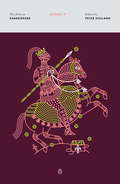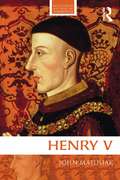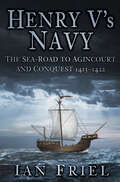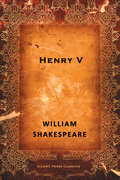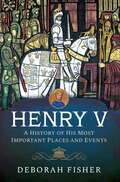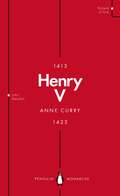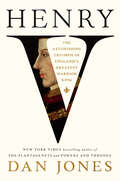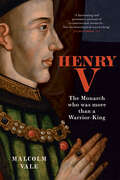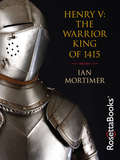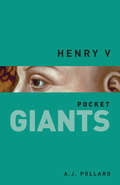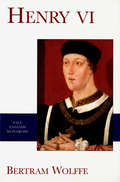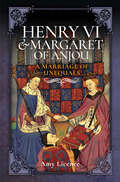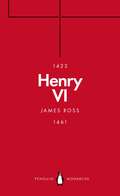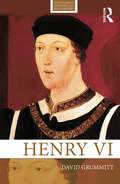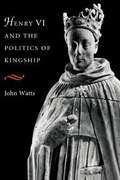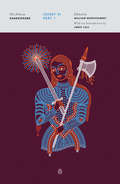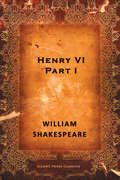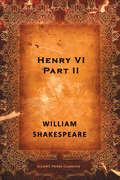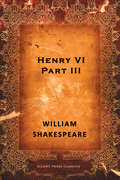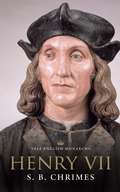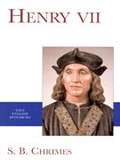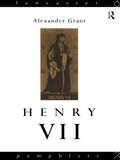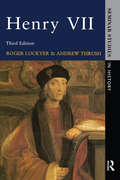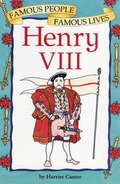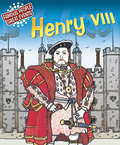- Table View
- List View
Henry V
by William Shakespeare Stephen Orgel A. R. Braunmuller Claire MceachernThe acclaimed Pelican Shakespeare series edited by A. R. Braunmuller and Stephen Orgel The legendary Pelican Shakespeare series features authoritative and meticulously researched texts paired with scholarship by renowned Shakespeareans. Each book includes an essay on the theatrical world of Shakespeare’s time, an introduction to the individual play, and a detailed note on the text used. Updated by general editors Stephen Orgel and A. R. Braunmuller, these easy-to-read editions incorporate over thirty years of Shakespeare scholarship undertaken since the original series, edited by Alfred Harbage, appeared between 1956 and 1967. With definitive texts and illuminating essays, the Pelican Shakespeare will remain a valued resource for students, teachers, and theater professionals for many years to come. For more than seventy years, Penguin has been the leading publisher of classic literature in the English-speaking world. With more than 1,700 titles, Penguin Classics represents a global bookshelf of the best works throughout history and across genres and disciplines. Readers trust the series to provide authoritative texts enhanced by introductions and notes by distinguished scholars and contemporary authors, as well as up-to-date translations by award-winning translators. From the Trade Paperback edition.
Henry V (Routledge Historical Biographies)
by John MatusiakHenry V of England, the princely hero of Shakespeare’s play, who successfully defeated the French at the Battle of Agincourt and came close to becoming crowned King of France, is one of the best known and most compelling monarchs in English history. This new biography takes a fresh look at his entire life and nine year reign, and gives a balanced view of Henry, who is traditionally seen as a great hero but has been more recently depicted as an obsessive egotist or, worse, a ruthless warlord. The book locates Henry’s style of kingship in the context of the time, and looks at often neglected other figures who influenced and helped him, such as his father and his uncles, Henry and Thomas Beaufort. John Matusiak shows that the situation confronting Henry at the outset of his reign was far more favourable than is often supposed but that he was nonetheless a man of prodigious gifts whose extraordinary achievements in battle left the deepest possible impression upon his contemporaries.
Henry V's Navy: The Sea-Road to Agincourt and Conquest 1413-1422
by Ian FrielWITHOUT HENRY V’S NAVY, the Battle of Agincourt would never have happened. Henry’s fleet played a major – if often unrecognised – part in enabling the king to come within reach of final victory in the Hundred Years War against France. Henry’s navy was one of the most successful fleets deployed by England before the time of Elizabeth I. The royal fleet was transformed in Henry’s short reign from a few dilapidated craft into a powerful weapon of war, with over thirty fighting vessels, up-to-date technology and four of the biggest ships in Europe. Drawing from extensive research into documentary, pictorial and archaeological sources, Henry V’s Navy is about the men, ships and operations of Henry’s sea war. Maritime historian Ian Friel explores everything from shipboard food to how crews and their ships sailed and fought, and takes an in-depth look at the royal ships. He also tells the dramatic and bloody story of the naval conflict, which at times came close to humiliating defeat for the English.
Henry V: A History
by William ShakespeareHenry V is Shakespeare’s most famous “war play”; it includes the storied English victory over the French at Agincourt. Some of it glorifies war, especially the choruses and Henry’s speeches urging his troops into battle. But we also hear bishops conniving for war to postpone a bill that would tax the church, and soldiers expecting to reap profits from the conflict. Even in the speeches of Henry and his nobles, there are many chilling references to the human cost of war.
Henry V: A History of His Most Important Places and Events
by Deborah FisherThere are many books about King Henry V, several of which concentrate entirely on his victory at the Battle of Agincourt in 1415. This one looks at his life from a different point of view, concentrating on places that were important in his life and can still be visited by those interested in getting a better feel for the man and understanding how his character was shaped by his environment. Henry spent much of his youth on military campaigns in Ireland, Wales and the Marches. As Prince of Wales, he became battle-hardened as a teenager when he received a near-fatal wound at Shrewsbury. Despite a fraught relationship with his father, he quickly reinvented himself as a model king, and set his eyes firmly on the crown of France. Thereafter, much of his nine-year reign was spent on military campaigns beyond the British Isles. The book takes its reader on a journey from the rural areas around Monmouth, where he was born, to Harlech Castle, where he put an end to Owain Glyndwr's rebellion, and from his coronation at Westminster Abbey to his private retreat at Kenilworth. We see him seize Harfleur and take the long road to Calais, culminating in the Battle of Agincourt, one of the most spectacular victories ever won by an English army. We follow his continued campaigns in France, through his marriage to Catherine of Valois at Troyes, to his eventual, tragically premature, death at Vincennes.
Henry V: From Playboy Prince to Warrior King (Penguin Monarchs)
by Anne CurryForemost medieval historian Anne Curry offers a new reinterpretation of Henry V and the battle that defined his kingship: AgincourtHenry V's invasion of France, in August 1415, represented a huge gamble. As heir to the throne, he had been a failure, cast into the political wilderness amid rumours that he planned to depose his father. Despite a complete change of character as king - founding monasteries, persecuting heretics, and enforcing the law to its extremes - little had gone right since. He was insecure in his kingdom, his reputation low. On the eve of his departure for France, he uncovered a plot by some of his closest associates to remove him from power. Agincourt was a battle that Henry should not have won - but he did, and the rest is history. Within five years, he was heir to the throne of France. In this vivid new interpretation, Anne Curry explores how Henry's hyperactive efforts to expunge his past failures, and his experience of crisis - which threatened to ruin everything he had struggled to achieve - defined his kingship, and how his astonishing success at Agincourt transformed his standing in the eyes of his contemporaries, and of all generations to come.
Henry V: The Astonishing Triumph of England's Greatest Warrior King
by Dan JonesThe New York Times bestselling author returns with a biography examining the dramatic life and unparalleled leadership of England's greatest medieval king Henry V reigned over England for only nine years and four months and died at the age of just thirty-five, but he looms over the landscape of the late Middle Ages and beyond. The victor of Agincourt, he is remembered as the acme of kingship, a model to be closely imitated by his successors. William Shakespeare deployed Henry V as a study in youthful folly redirected to sober statesmanship. For one modern medievalist, Henry was, quite simply, &“the greatest man who ever ruled England.&” For Dan Jones, Henry V is one of the most intriguing characters in all medieval history, but one of the hardest to pin down. He was a hardened, sometimes brutal warrior, yet he was also creative and artistic, with a bookish temperament. He was a leader who made many mistakes, who misjudged his friends and family, but he always seemed to triumph when it mattered. As king, he saved a shattered country from economic ruin, put down rebellions, and secured England&’s borders; in foreign diplomacy, he made England a serious player once more. Yet through his conquests in northern France, he sowed the seeds for three generations of calamity at home, in the form of the Wars of the Roses. Henry V is a historical titan whose legacy has become a complicated one. To understand the man behind the legend, Jones first examines Henry&’s years of apprenticeship, when he saw the downfall of one king and the turbulent reign of another. Upon his accession in 1413, he had already been politically and militarily active for years, and his extraordinary achievements as king would come shortly after, earning him an unparalleled historical reputation. Writing with his characteristic wit and style, Jones delivers a thrilling and unmissable life of England&’s greatest king.
Henry V: The Conscience of a King
by Mr Malcolm ValeFor curious readers young and old, a rich and colorful history of religion from humanity's earliest days to our own contentious times In an era of hardening religious attitudes and explosive religious violence, this book offers a welcome antidote. Richard Holloway retells the entire history of religion--from the dawn of religious belief to the twenty-first century--with deepest respect and a keen commitment to accuracy. Writing for those with faith and those without, and especially for young readers, he encourages curiosity and tolerance, accentuates nuance and mystery, and calmly restores a sense of the value of faith. Ranging far beyond the major world religions of Judaism, Islam, Christianity, Buddhism, and Hinduism, Holloway also examines where religious belief comes from, the search for meaning throughout history, today's fascinations with Scientology and creationism, religiously motivated violence, hostilities between religious people and secularists, and more. Holloway proves an empathic yet discerning guide to the enduring significance of faith and its power from ancient times to our own.
Henry V: The Warrior King of 1415
by Ian MortimerFrom an award-winning historian: &“A new and convincing likeness of medieval England&’s most iconic king&” (The Sunday Times). This biography by the bestselling author of The Time Traveler&’s Guide to Medieval England takes an insightful look at the life of Henry V, casting new light on a period in history often held up as legend. A great English hero, Henry V was lionized by Shakespeare and revered by his countrymen for his religious commitment, his sense of justice, and his military victories. Here, noted historian and biographer Ian Mortimer takes a look at the man behind the legend and offers a clear, historically accurate, and realistic representation of a ruler who was all too human—and digs up fascinating details about Henry V&’s reign that have been lost to history, including the brutal strategies he adopted at the Battle of Agincourt. &“The most illuminating exploration of the reality of 15th-century life that I have ever read.&” —The Independent &“Compelling, exuberant . . . vivid.&” —Simon Sebag Montefiore, New York Times–bestselling author of The Romanovs: 1613–1918
Henry V: pocket GIANTS (Pocket GIANTS)
by A. J. PollardHenry V is the best-known military hero in English history: better known than Marlborough or Wellington, or his grandfather, Edward III. He enjoyed more success against the French than any of them, coming tantalisingly close to conquering that vast country and imposing an English dynasty; this in a reign of just nine years, in only seven of which he was at war. Even before he died the heroic myth, later enshrined by Shakespeare, was being created. His victories have become the touchstone of English nationalism, English militarism and English imperialism. For good or ill, Henry V now signifies the one-time ‘Greatness of England’. He was a military genius, yet his megalomania was not always in the best interests of his own kingdom, let alone the people of France who suffered at his hands. Behind the carefully constructed nationalist myth was a cold, calculating, ruthless ruler who, before his early death, revealed ominous tyrannical tendencies.
Henry VI
by Bertram WolffeIn this widely acclaimed biography, Bertram Wolffe challenges the traditional view of Henry VI as an unworldly, innocent, and saintly monarch and offers instead a finely drawn but critical portrait of an ineffectual ruler. Drawing on widespread contemporary evidence, Wolffe describes the failures of Henry's long reign from 1422 to 1471, which included the collapse of justice, the loss of the French territories, and the final disintegration of his government. He argues that the posthumous cult of Henry was promoted by Henry VII as a way of excusing his uncle's political failures while enhancing the image of the dynasty. This edition includes a new foreword by John Watts that discusses the book and its place in the evolving literature.Reviews of the earlier edition:"A brilliant biography that brings us as near as we are ever likely to come to this elusive personality."--Sunday Times (London)"A powerful, compulsively readable portrait."--Observer "Much learning, skillfully deployed as here, evokes pleasure as well as admiration."--R.L. Storey, Times Literary Supplement
Henry VI & Margaret of Anjou: A Marriage of Unequals
by Amy Licence“An illuminating and entertaining read . . . an analytical assessment of the two figures who led the Lancastrian faction during the Wars of the Roses.” —History . . . The Interesting Bits!He became king before his first birthday, inheriting a vast empire from his military hero father; she was the daughter of a king without power, who made an unexpected marriage at the age of fifteen. Almost completely opposite in character, together they formed an unlikely but complimentary partnership.Henry VI and Margaret of Anjou have become famous as the Lancastrian king and queen who were deposed during the Wars of the Roses but there is so much more to their story. The political narrative of their years together is a tale of twists and turns, encompassing incredible highs, when they came close to fulfilling their desires, and terrible, heart-breaking lows. Personally, their story is an intriguing one that raises may questions. Henry was a complex, misunderstood man, enlightened and unsuited to his times and the pressures of kingship. In the end, overcome by fortune and the sheer determination of their enemies, their alliance collapsed. England simply wasn’t ready for a gentle king like Henry, or woman like Margaret who defied contemporary stereotypes of gender and queenship.History has been a harsh judge to this royal couple. In this discerning dual biography, Amy Licence leads the way in a long-overdue re-evaluation of their characters and contributions during a tumultuous and defining period of British history. “A delight to read . . . A fresh new look at this power couple.” —Adventures of a Tudor Nerd
Henry VI (Penguin Monarchs)
by James RossHenry VI, son of the all-conquering Henry V, was one of the least able and least successful of English kings. His long reign, which started when he was only nine months old, ended in catastrophe, with the loss of England's territories in France and a bankrupt England's long decline into civil war: the wars of the Roses. Yet, failure though Henry undoubtedly was, he remains an enigma. Was he always, as he became in the last disastrous years of his rule, a holy fool, simple-minded to the point of insanity and prey to the ambitions of others? Or was he more active and, as some have suggested, actively malign? In this groundbreaking new portrait, James Ross shows a king whose priorities diverged sharply from what England expected of its monarchs, and whose fitful engagement with government was directly, though not solely, responsible for the disasters that engulfed the kingdom during his reign.
Henry VI (Routledge Historical Biographies)
by David GrummittIn this new assessment of Henry VI, David Grummitt synthesizes a wealth of detailed research into Lancastrian England that has taken place throughout the last three decades to provide a fresh appraisal of the house’s last King. The biography places Henry in the context of Lancastrian political culture and considers how his reign was shaped by the times in which he lived. Henry VI is one of the most controversial of England’s medieval kings. Coming to the throne in 1422 at the age of only nine months and inheriting the crowns of both England and France, he reigned for 39 years before losing his position to the Yorkist king, Edward IV, in the early stages of the Wars of the Roses. Almost a decade later, in 1470, he briefly regained the throne, only for his cause to be decisively defeated in battle the following year, after which Henry himself was almost certainly murdered. Henry continues to perplex and fascinate the modern reader, who struggles to understand how such an obviously ill-suited king could continue to reign for nearly forty years and command such loyalty, even after his cause was lost. From his coronation at nine months old, to the legacy of his reign in the centuries after his death, this is a balanced, detailed and engaging biography of one of England’s most enigmatic kings and will be essential reading for all students of late medieval England, and the Wars of the Roses.
Henry VI And The Politics Of Kingship
by John WattsHenry VI (1422-61) was one of the most spectacularly inadequate kings of England, and his reign dissolved into the conflict known as the Wars of the Roses. Yet he held on to his throne for thirty-nine years and, for almost thirty of them, without much difficulty. What was the nature of Henry's inadequacy, and why did it have such ambivalent and complicated results? <P><P> This book looks intensively at the political system itself, rather than at individuals, their personalities and patronage networks, and thus offers the first truly structured narrative of the reign.<P> A paperback edition of the most detailed and original account of the reign of Henry VI to have appeared in many years.<P> Sheds light on the other reigns in later medieval England, during the period of the 'Wars of the Roses'.<P> Re-asserts the notoriously 'weak' king Henry VI in terms of constitutional aims and priorities.<P>
Henry VI, Part 1 (The Pelican Shakespeare)
by William Shakespeare Stephen Orgel A. R. Braunmuller William Montgomery Janis LullThe acclaimed Pelican Shakespeare series edited by A. R. Braunmuller and Stephen Orgel The legendary Pelican Shakespeare series features authoritative and meticulously researched texts paired with scholarship by renowned Shakespeareans. Each book includes an essay on the theatrical world of Shakespeare’s time, an introduction to the individual play, and a detailed note on the text used. Updated by general editors Stephen Orgel and A. R. Braunmuller, these easy-to-read editions incorporate over thirty years of Shakespeare scholarship undertaken since the original series, edited by Alfred Harbage, appeared between 1956 and 1967. With definitive texts and illuminating essays, the Pelican Shakespeare will remain a valued resource for students, teachers, and theater professionals for many years to come. For more than seventy years, Penguin has been the leading publisher of classic literature in the English-speaking world. With more than 1,800 titles, Penguin Classics represents a global bookshelf of the best works throughout history and across genres and disciplines. Readers trust the series to provide authoritative texts enhanced by introductions and notes by distinguished scholars and contemporary authors, as well as up-to-date translations by award-winning translators.
Henry VI, Part I: A History
by William ShakespeareAfter the death of King Henry V, King Henry VI must ascend to the throne amist the chaos of the Hundred Years' War and internal struggles closer to home that threaten the British monarchy.
Henry VI, Part II: A History
by William ShakespeareKing Henry VI's reign is beset with infighting among the nobility as the War of the Roses breaks out in full and the king faces open rebellion as the Duke of York makes a claim for the throne .
Henry VI, Part III: A History
by William ShakespeareKing Henry VI is now on the run, defending his crown from the Yorkists in a conflict that will determine the fate of the British monarchy.
Henry VII
by S. B. ChrimesFounder of the Tudor dynasty, Henry VII was a crucial figure in English history. In this acclaimed study of the king's life and reign, the distinguished historian S. B. Chrimes explores the circumstances surrounding Henry's acquisition of the throne, examines the personnel and machinery of government, and surveys the king's social, political, and economic policies, law enforcement, and foreign strategy. This edition of the book includes a new critical introduction and bibliographical updating by George Bernard.
Henry VII
by Stanley B. ChrimesFounder of the Tudor dynasty, Henry VII was a crucial figure in English history. In this acclaimed study of the king's life & reign, the distinguished historian S. B. Chrimes explores the circumstances surrounding Henry's acquisition of the throne, examines the personnel & machinery of government, & surveys the king's social, political, & economic policies, law enforcement, & foreign strategy. This edition of the book includes a new critical introduction & bibliographical updating by George Bernard.
Henry VII (Lancaster Pamphlets)
by Alexander GrantThe importance of Henry VII is the subject of heated debate. Did his reign mark the start of a new era, or was its prevailing characteristic continunity with the past? The pamphlet:· emphasizes the lasting political stability established during the reign· demonstrates the difference between Henry's policies and those of the Yorkists· shows how successors built on Henry's legacy· argues that victory at Bosworth in 1485 can be seen as initiating a genunine 'Tudor revolution in government'.
Henry VII (Seminar Studies)
by Roger Lockyer Andrew ThrushThis study reassesses the policies of the founder of the Tudor dynasty and shows how Henry worked within existing traditions rather than breaking with the past. Every facet of the reign is considered including the nature of government - both at central and local level, financial policy, relations with the Church, foreign policy, economic affairs and concludes by assessing Henry as a 'new monarch'.
Henry VIII (Famous People, Famous Lives #12)
by Harriet CastorExciting stories about famous people, outlining their lives and the important events which made them memorable. Every page features easy-to-follow text and a black-and-white line drawing to help bring these events to life. Each title gives further facts about the famous person and the times in which he or she lived, plus a comprehensive time line detailing key dates. Henry VIII is an exciting tale of kings and queens, jousting knights and grisly executions. It explains how Henry took power away from the Church in his quest for an heir to inherit his kingdom.
Henry VIII (Famous People, Great Events #5)
by Harriet CastorExciting stories about famous people, outlining their lives and the important events which made them memorable. Every page features easy-to-follow text and a black-and-white line drawing to help bring these events to life. Each title gives further facts about the famous person and the times in which he or she lived, plus a comprehensive time line detailing key dates. Henry VIII is an exciting tale of kings and queens, jousting knights and grisly executions. It explains how Henry took power away from the Church in his quest for an heir to inherit his kingdom.
